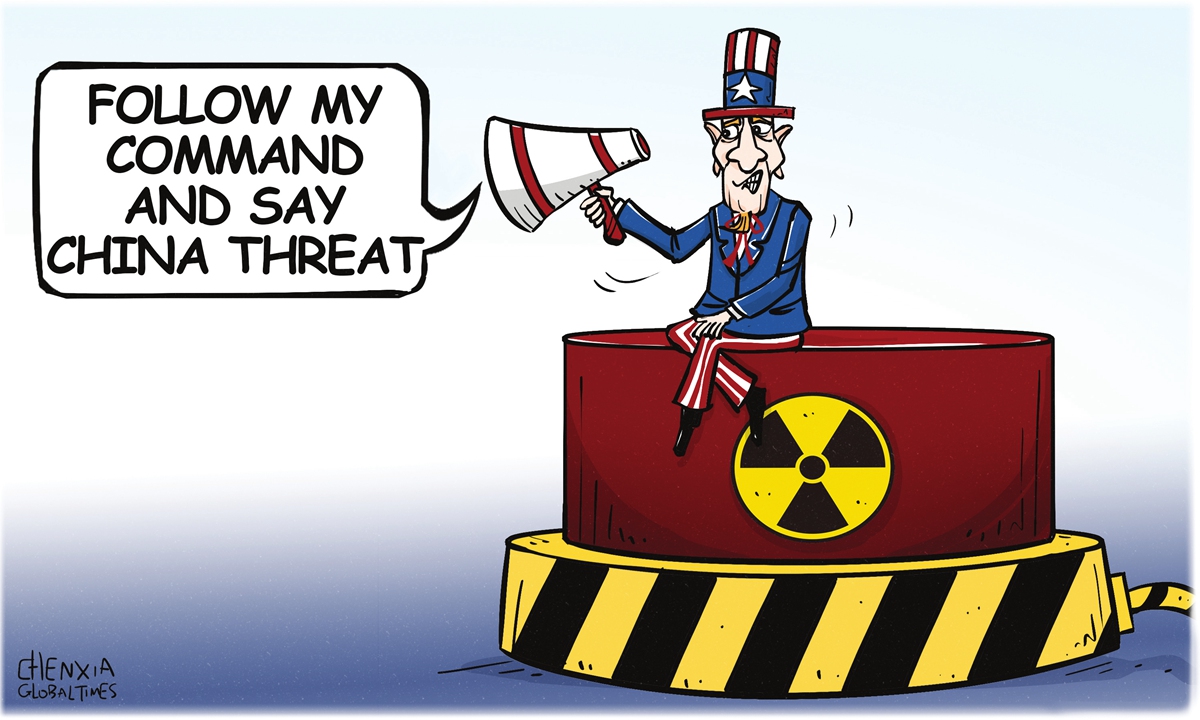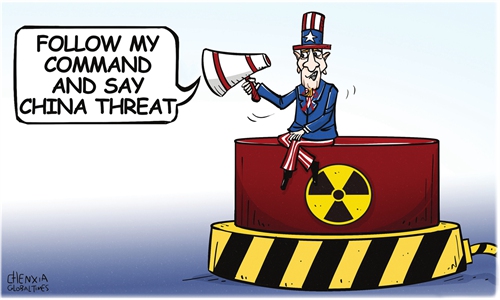From a nuclear briefcase to hypocritical accusations against China, the G7 a drama driven by farce

Illustration: Chen Xia/GT
On Saturday morning, during his Hiroshima visit, US President Joe Biden tweeted, "The G7 is more united than ever." The rhetoric, amid the ongoing summit which has been filled with dramas, rang an ironic tone.Drama No.1 is a detail - Biden carried a nuclear briefcase to Hiroshima where the US dropped the world's first atomic bomb in 1945 and visited the Peace Memorial Park in Hiroshima on Friday when paying tribute to the bomb victims.
Some American media outlets tried to explain that the briefcase, more commonly referred to as the "nuclear football," or "nuclear button," always accompanies US president on visits both at home and abroad. It had appeared in Hiroshima before, with very few noticed it. But this time, neither the US nor Japan decided to keep things low-key. The briefcase showing up in a place which was the target of a nuclear weapon is widely observed by media outlets, and criticism from the Japanese public has been bubbling to the surface.
What's behind the detail is the dark side of friendship between Washington and Tokyo, with a sense of power struggle, experts said.
Japan's awe and fear toward the US are weakening. Especially when witnessing the intense geopolitical rivalry between China and the US, Japan has begun to feel that its importance to the US has been boosted. So, at the G7 summit in Hiroshima, in the face of a range of planned activities, Japan is taking tentative steps toward the US, Shen Yi, a professor at Fudan University, told the Global Times.
To put it more bluntly, the Japanese government is seeking an apology, playing the victim, covering up its fascist history, aggressive wars against other countries and the attack on Pearl Harbor, observers noticed. The US is not buying this proposition. The US side made it pretty clear that Biden will not apologize for Hiroshima bombing before he kickstarted this trip. And then, the US president went to the peace memorial park with the nuclear briefcase in a high-profile manner, according to Japanese media.
This is not only a US reminder over who won WWII, but also a US message toward Japan: I might speak softly to you, but I am carrying a stick. Some netizens even interpreted this as the US telling Japan who is the boss.
Objectively, the two atomic bombs dropped on Japan did result in the deaths of a large number of innocent civilians. But the root cause was Japan's aggressive wars, which brought disasters to other countries and eventually backfired. Japan should reflect deeper on what militarism led to, rather than blurring the boundaries between then Japanese militaristic rule and innocent Japanese people, pretending the country was only a victim, Lü Xiang, a research fellow with the Chinese Academy of Social Sciences, told the Global Times.
At this point, at the historic venue, Japan should contemplate how to play a role for peace in the future instead of being a source of conflict and trouble, escalating hostilities, Lü added.
Unfortunately, when G7 leaders pledged on Friday their commitment to achieving a world without nuclear weapons while ensuring security for all, they took aim at China, ridiculously claiming that China is accelerating the build-up of its nuclear arsenal without transparency, which "poses a concern to global and regional stability."
Really? The few Western countries, busy extending their nuclear deterrence, especially the US, who with about 5,500 nuclear weapons refuses to commit to no first use of them, are pointing fingers at China, who possesses far fewer nuclear warheads than the US, and is the only country among the five nuclear-weapon states who has pledged to "no first use" of nuclear weapons at any time and under any circumstances.
If the G7 leaders can commit to being more responsible, like focusing more on cooperation on climate change, promoting a post-pandemic global economic recovery and development, rather than pushing for geopolitical competition and bloc confrontation over and over again, the world would have realized "security for all" long ago. As long as they are trapped in their own Cold War mentality and obsession with camp confrontation, which is the source of today's global instability, the call for a world without nuclear weapons, or nuclear disarmament is merely a pipe dream.
When G7 countries constantly repeat these clichés, it tells that they have no more tools to use against China. And it is quite likely that some G7 members, after half-heartedly echoing ideological statement with their "like-minded" partners, will go back and keep doing business with China. That's why G7's Saturday statement is as binary as frequently expressed lately - G7 wants "stable," "constructive" relations with China, while "expressing our concerns directly to China."
From a nuclear briefcase to hypocritical smears against China, and to Japan serving food from Fukushima to G7 guests, in attempt to legitimize Japan's dumping of nuclear-contaminated water, all people see is controversy, drama, and each and every unspoken calculation. The only thing missing is unity.

